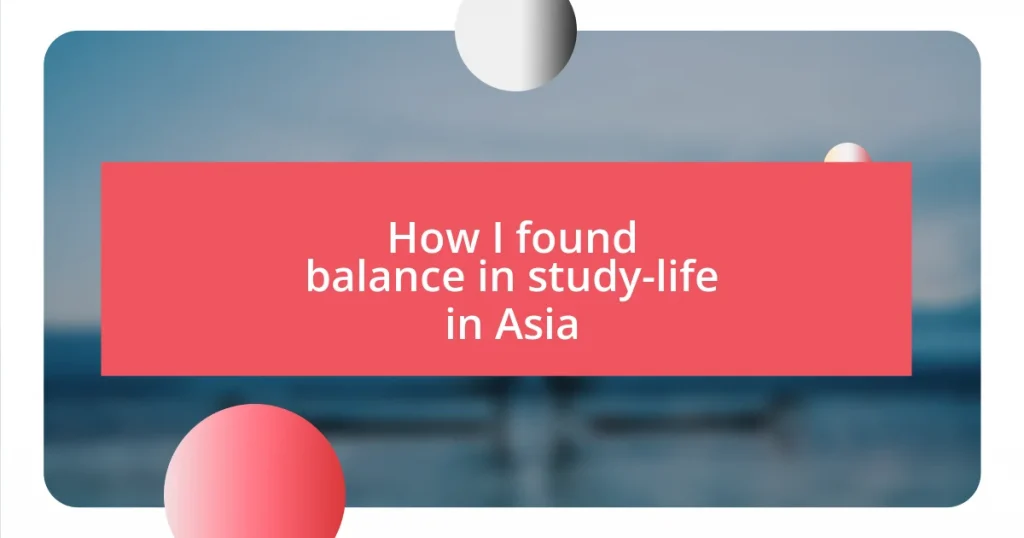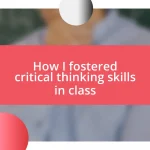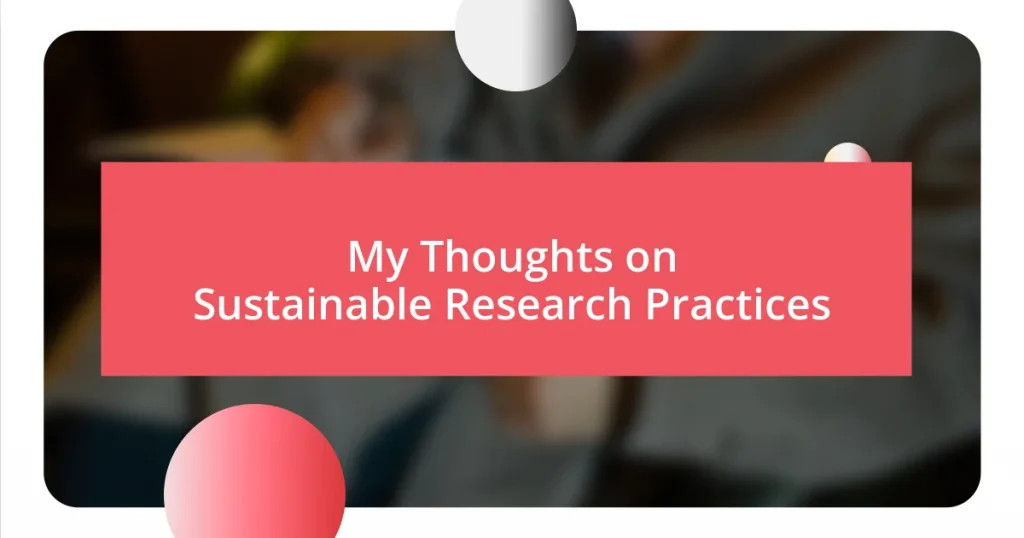Key takeaways:
- Realized that true balance in academia involves prioritizing mental well-being alongside studying, highlighted by experiences of burnout from overcommitment to academics.
- Identified cultural and language challenges in studying in Asia, which required adaptability and resilience while fostering personal growth through community engagement.
- Emphasized the importance of self-care and creating a supportive environment, using strategies like time management and incorporating cultural practices to maintain balance and motivation.
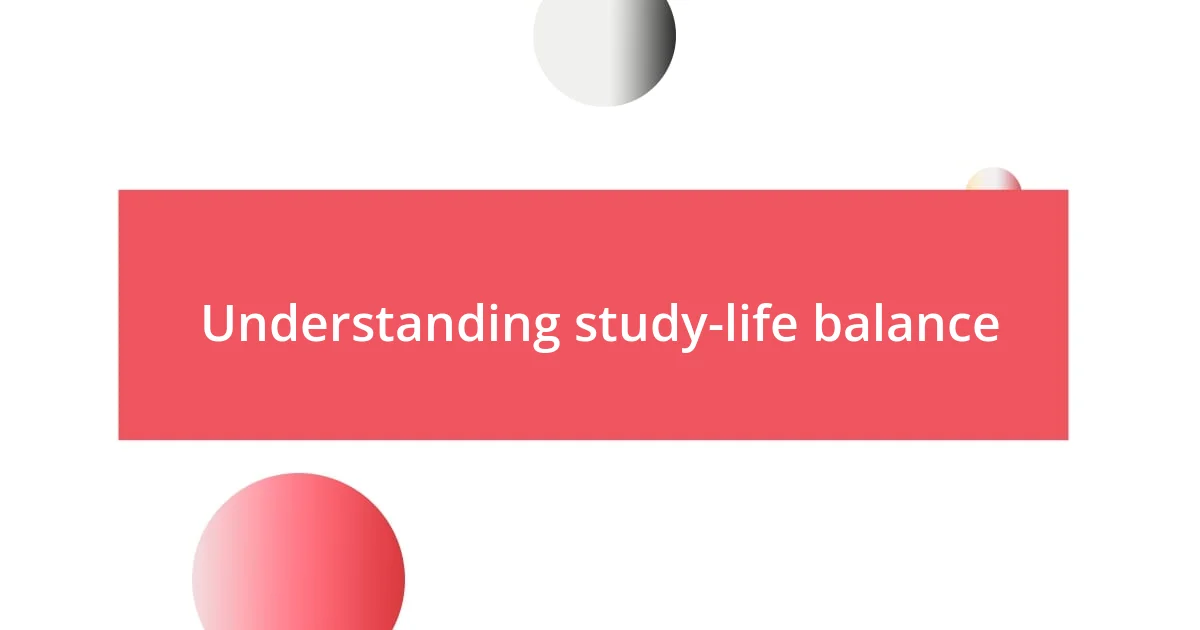
Understanding study-life balance
Study-life balance encompasses more than just managing time; it’s about understanding personal priorities and mental well-being. I vividly remember the pressure of juggling classes, projects, and a social life, often leaving me exhausted. Have you ever felt overwhelmed by the sheer workload, questioning if you’ve sacrificed too much of your personal time?
In my early university days in Asia, I struggled with the notion of balance. I thought late-night study marathons were key to academic success, but they only led to burnout. Reflecting on that time, I realized that true balance is not solely about academic performance; it’s about emotional health, too.
Finding that equilibrium often meant being intentional about my time—like setting aside weekends for leisure or self-reflection. There was that one Sunday when I decided to ditch my textbooks and explore a local market; the laughter and vibrant atmosphere rejuvenated my spirit. Isn’t it amazing how stepping away for a moment can give you renewed clarity?
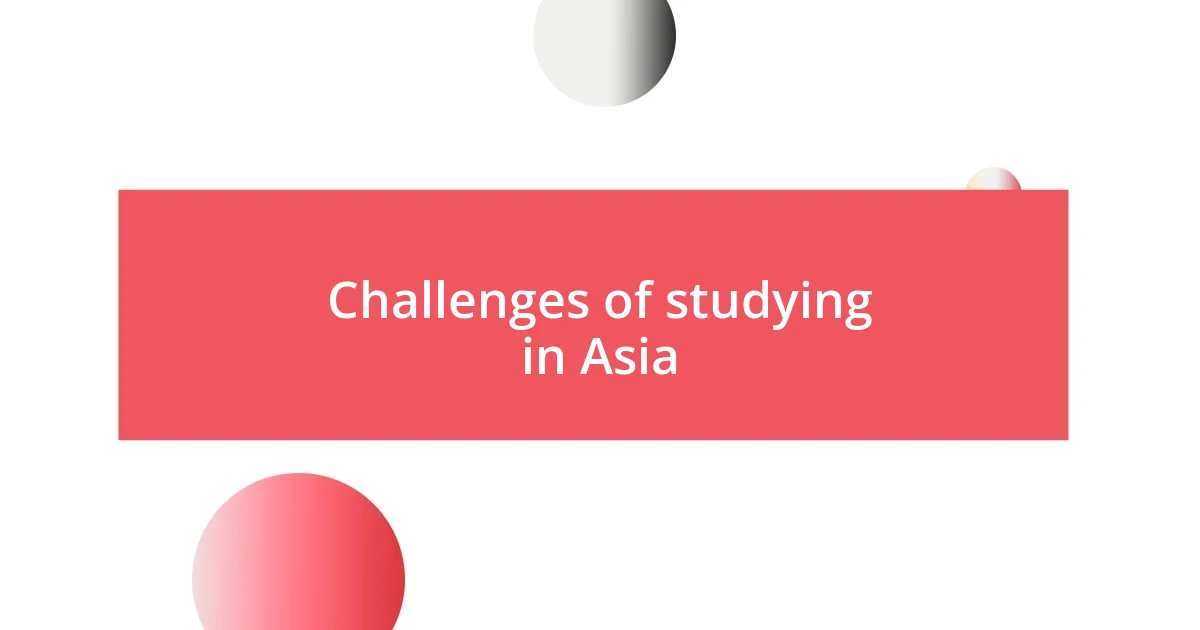
Challenges of studying in Asia
Studying in Asia comes with its unique set of challenges. One significant issue I encountered was the cultural pressure to excel. In many Asian countries, there’s a deep-rooted belief that success in academics is paramount, which can create immense stress. I remember sitting in a crowded cafeteria, overhearing classmates discussing grades with such intensity that it made my stomach churn. The competition can feel so overwhelming that it often pushes students to the brink of anxiety.
Another hurdle is the language barrier. Although many courses are offered in English, navigating everyday life in a different language can be daunting. I recall my first few weeks, struggling to order food or ask for directions, realizing that these seemingly simple tasks could take up so much mental energy. Finding balance in communication is essential, and it sometimes felt isolating when I couldn’t fully express myself.
Lastly, the variance in educational systems poses its own set of challenges. Each university handles exams, coursework, and grading differently. I vividly remember being confused by a new grading system after transferring schools. I had to invest extra time understanding the differences, which taught me to be adaptable and resilient in my studies. Isn’t it ironic how these challenges force us to grow, often leading to a deeper understanding of ourselves?
| Challenge | Personal Insight |
|---|---|
| Cultural Pressure to Excel | It fosters an intense academic competition, making it hard to maintain mental well-being. |
| Language Barrier | Everyday communication can become exhausting and isolating, impacting social interactions. |
| Variance in Educational Systems | Adapting to new grading systems requires resilience and can lead to confusion. |
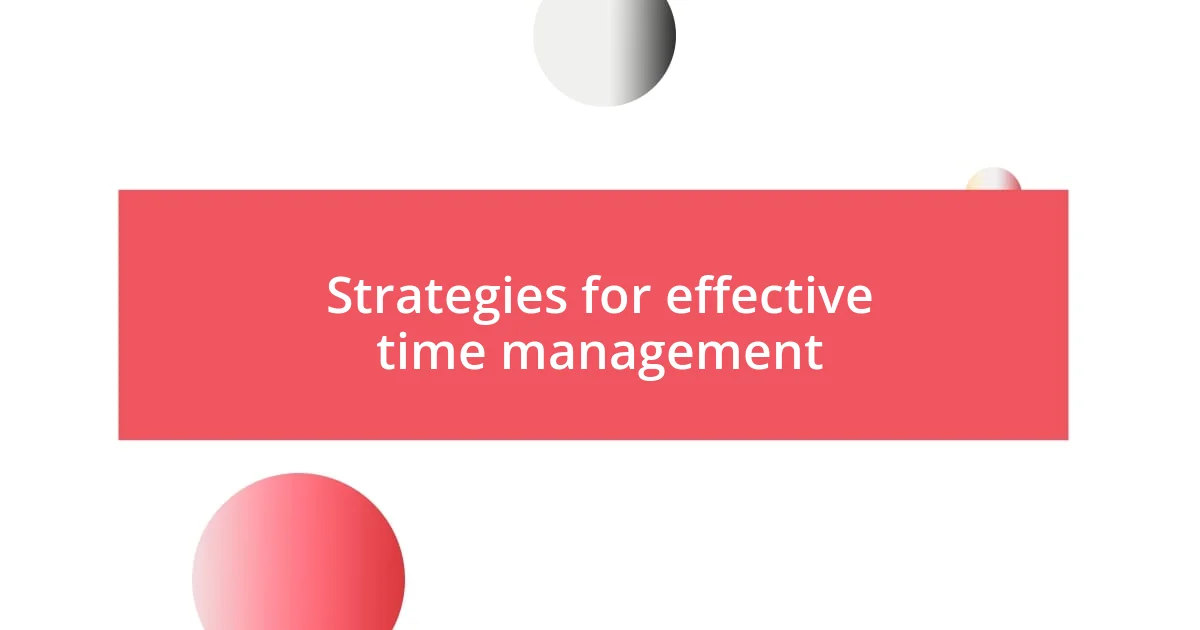
Strategies for effective time management
Effective time management was a game-changer for my academic journey; it significantly eased my stress levels. I discovered that creating a well-structured schedule helped me prioritize tasks without overwhelming myself. Just last semester, I began setting specific blocks of time for study sessions, and it was surprisingly liberating. I never imagined how much more productive I could be when I designated time slots for deep work and breaks.
Here are some strategies that really worked for me:
- Prioritize tasks: Use a system like the Eisenhower Matrix to distinguish between what’s urgent and important.
- Set specific goals: Break assignments into manageable parts and set deadlines for each section; this reduces procrastination.
- Use time blocks: Allocate focused study periods followed by short breaks to maintain focus without fatigue.
- Leverage technology: Use apps for reminders and timers; they can keep you accountable and on track.
- Reflect regularly: At the end of each week, I’d reflect on what worked and adjust my approach accordingly. This constant evolution empowered me to stay organized.
Sometimes I would find myself overwhelmed, only to realize I’d neglected this crucial step. During one particularly hectic week, I opted to spend an afternoon reviewing my planner. That simple act transformed my chaotic thoughts into a clear path forward, reminding me of the importance of adaptability in my time management strategies.
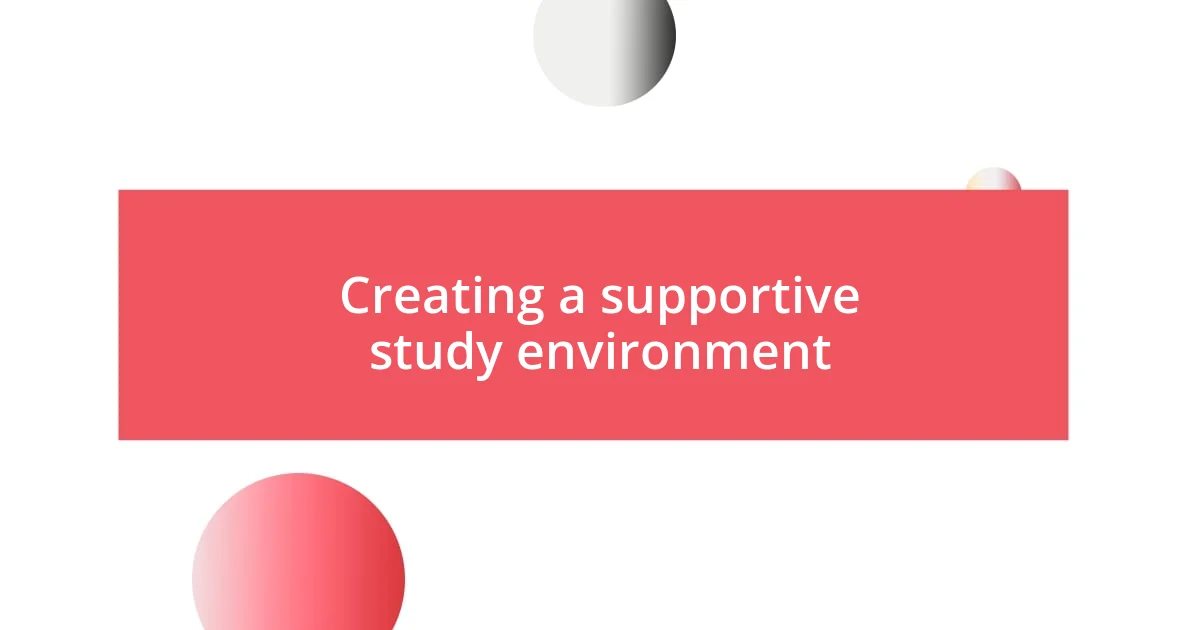
Creating a supportive study environment
Creating a supportive study environment is vital for academic success, especially in a place as diverse as Asia. When I first arrived at my university, I quickly realized that my surroundings had a profound impact on my focus and motivation. I remember finding a quiet nook in the library where the light was just right and the noise level was minimal. That small, personalized corner became my sanctuary, proving that a designated space can encourage productivity and reduce distractions.
Moreover, I learned the value of building a community. Early on, I reached out to classmates and formed study groups. The camaraderie we built not only made study sessions enjoyable but also fostered a sense of belonging. Sharing notes and discussing complicated topics created a supportive atmosphere that helped alleviate the local academic pressures. Isn’t it amazing how collaboration can significantly lighten the load?
Another crucial aspect involved creating a balanced atmosphere in my living space. I turned my room into an inviting study zone by incorporating plants and inspirational quotes that resonated with my goals. Each time I sat at my desk, the space reminded me to stay focused while also promoting positivity. I often ask myself, “Am I nurturing my study space enough?” and this reflection has guided me toward making my environment more conducive to learning.
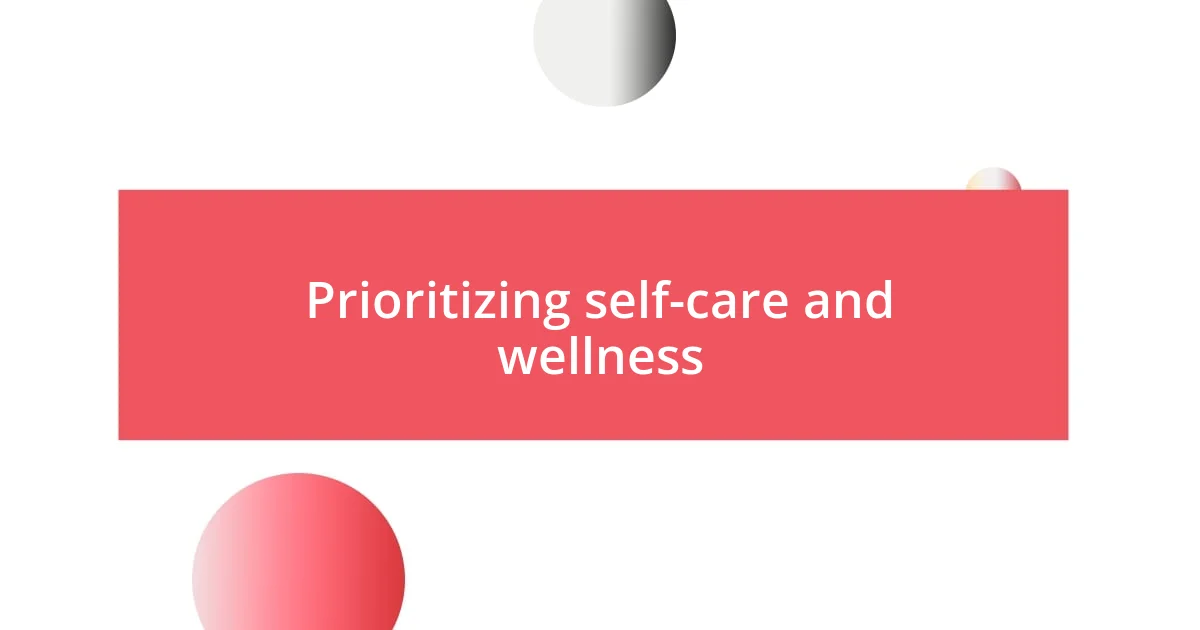
Prioritizing self-care and wellness
Taking care of myself became a priority I couldn’t ignore. I vividly remember a week when I immersed myself in my studies, neglecting sleep and proper nutrition. By the end of it, I felt depleted—not just physically, but mentally as well. That experience was a wake-up call; I decided it was time to incorporate self-care rituals into my daily routine. Even as a student, I found ways to integrate practices like meditation and daily exercise. Just 10 minutes of mindfulness transformed my focus and overall outlook. Have you noticed how a little intentional self-care can make a significant difference?
Finding a balance between my academic responsibilities and personal wellness has been a journey. One memorable evening, as I sat down for dinner after a long day, I realized how important it was to savor those moments away from books. I started dedicating Sunday evenings to cooking healthy meals and taking leisurely walks. These simple yet effective habits reminded me to recharge and fostered a deeper connection with myself. It’s amazing how these small actions create a ripple effect, don’t you think?
I’ve learned that prioritizing self-care isn’t just a luxury; it’s a necessity in academia. Treating myself to an occasional spa day or simply a warm bubble bath after a challenging week worked wonders for my mental health. I genuinely believe that we owe it to ourselves to cultivate habits that promote well-being. By maintaining this mindset, I transformed my study life from one of stress to one that celebrates balance and mindfulness. Can we all agree that nurturing ourselves goes hand in hand with achieving those academic goals?
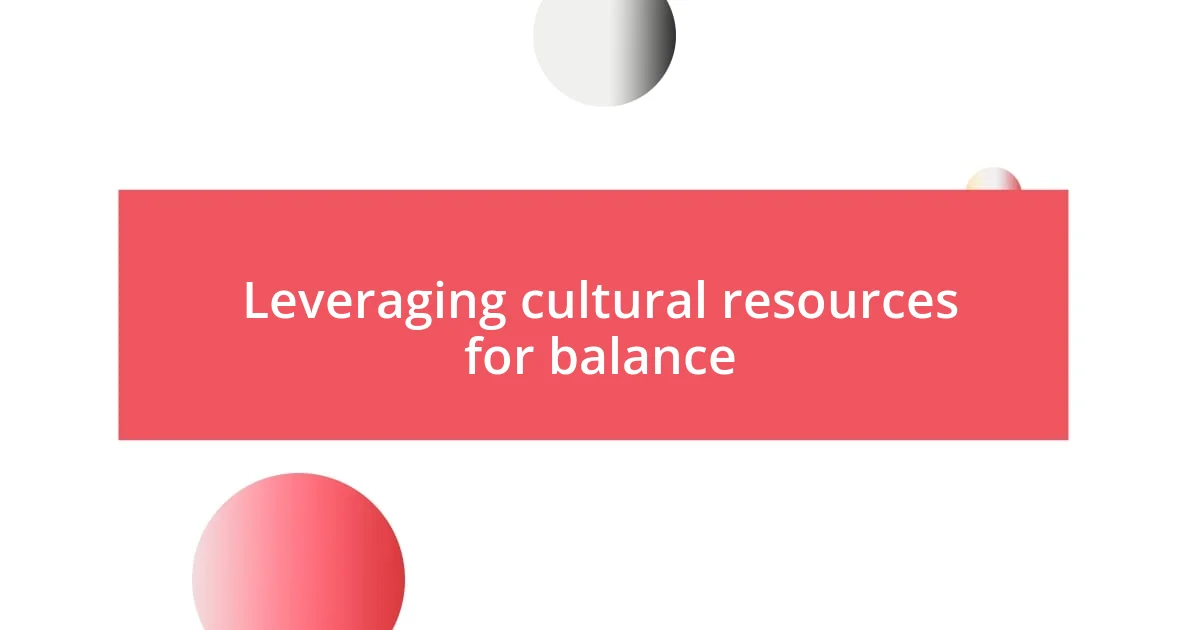
Leveraging cultural resources for balance
Cultural resources played a central role in my quest for balance while studying in Asia. I distinctly recall attending a traditional tea ceremony during my first semester. The experience not only immersed me in a rich cultural practice but also allowed me to slow down and appreciate the moment. Engaging in these cultural traditions became a gentle reminder of the importance of mindfulness in our hectic lives. How often do we rush past precious moments without truly experiencing them?
Exploring local festivals and annual celebrations enriched my life beyond academia. One unforgettable day was spent at a lantern festival, where the beauty of the illuminated sky brought a sense of peace. I realized that spending time in such vibrant cultural settings allowed me to connect with my surroundings and recharge my spirit. Isn’t it incredible how these experiences can lift our energy and motivate us in our studies?
Moreover, I frequently found solace in community activities, like volunteering during cultural events. I remember the joy of helping organize a local market, where the blend of food, music, and laughter filled the air. These moments of contribution not only strengthened my connection to the community but also provided balance amid my studies. It sparked the question in me, “How can helping others lead to my own personal growth?” The answers unfolded with every interaction, ultimately making my study experience richer and more fulfilling.
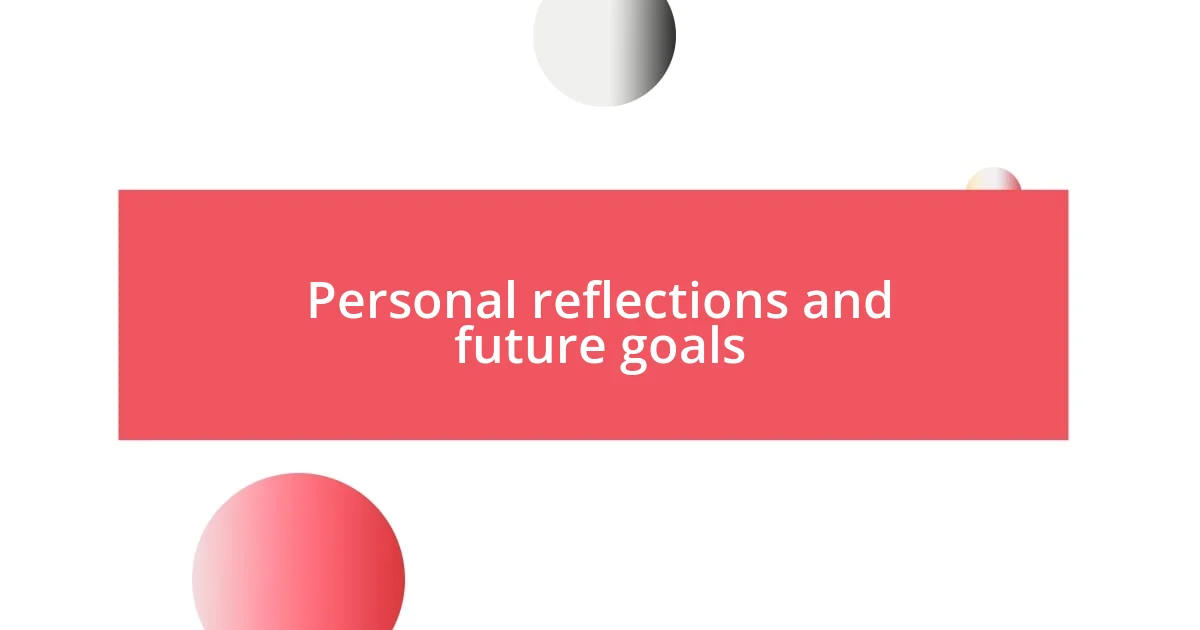
Personal reflections and future goals
Reflecting on my journey, I often find myself amazed at how far I’ve come in seeking balance. There was a time when I mistakenly believed that relentless study hours were the key to success. I remember sitting alone in my room during finals, surrounded by endless books, feeling a palpable sense of isolation. It felt suffocating. That period taught me the invaluable lesson that human connection is just as critical. Have you ever felt that while you’re working hard, you’re missing out on moments that truly enrich your life?
Looking to the future, I envision incorporating even more experiences that deepen my sense of balance. I’ve started setting aside time to explore new places and embrace various hobbies, which feels essential for my growth. For instance, I recently picked up photography—capturing the vibrant streets of my city with a camera gives me a sense of fulfillment and creative expression that studying often can’t. Isn’t it great how pursuing something completely different can reignite your passion for your primary goals?
Ultimately, my journey has guided me toward clearer future aspirations. I aim to blend my academic pursuits with community engagement, perhaps through mentorship programs for younger students. I can already see this enriching my life while supporting others in their studies. Have you ever thought about how your passions could impact those around you? It excites me to know that the balance I’ve worked to create can now extend to help others on their journeys, too.










